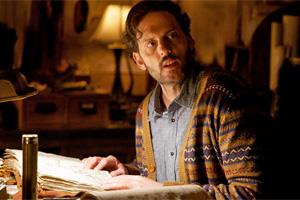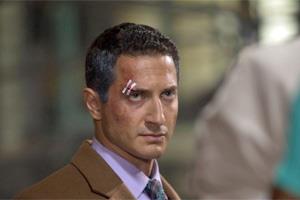“Foretold our fate; but, by the god’s decree, all heard, and none believed the prophecy.”
This quote, from the Latin epic poem The Aeneid, appears before one of the episodes of Grimm in its 6th and final season. NBC is bringing Grimm to an end on Friday, March 31. It is a great line to describe the show’s premise and my feelings when I found out the show was coming to an end.
The show, which combines police drama with horror, features our hero, Nick Burkhardt (David Giuntoli, top), a Portland, Oregon cop who discovers he’s a Grimm, as in the brothers Grimm.
Jacob and Wilhelm Grimm were academics who collected and published folklore in the 19th century. The TV show imagines those tales not as folklore, but true stories about real beings, know as Wesen. Wesen is German for “beings” and Grimm for “creatures.” The Wesen appear as human to normal people, but the Grimm sees what they are when they woge, that is, turn into their creature selves. The Wesen can spot the Grimm by the look in his or her eyes. Just as these creatures come from legends told to us over many generations, as children the Wesen were warned about the Grimm who is on earth to kill them. Indeed, the storylines were borrowed from legends and cultural folklore and placed in modern day life.

It’s an interesting premise, but what I love about the show is that it doesn’t fall into the trap of taking itself too seriously. There are great humor and great characters mixed into the storyline. It’s not all about the “Chosen One,” but about his friends, as well. In that sense, Grimm is a great successor to Joss Whedon’s brilliant creations Buffy the Vampire Slayer and Angel. Indeed, the show’s co-creator and executive producer, David Greenwalt, was a co-executive producer of Buffy and a co-creator of Angel. His partner in Grimm is Jim Kouf who also wrote for Angel. They brought that same sensibility to Grimm, which often took monsters as metaphor.
Just like in Buffy and Angel, not all Grimm monsters are bad. Right from the beginning, Nick befriends Monroe (Silas Weir Mitchell, above, left) who is a Blutbad, or a big, bad wolf. Monroe is a history geek and understands the Wesen so well he helps Nick and assists him in distinguishing between good and bad, as does Monroe’s later love interest and Fuchsbau (a Wesen resembling a fox), Rosalee (Bree Turner). Blurring the lines between the two are the Zauberbiest and Hexenbiest, or warlocks and witches, including Nick’s boss, Captain Sean Renard (Sasha Roiz, below, left) and his lover Adalind (Claire Coffee). By the way, if you’re noticing a lot of German words here, the German language runs throughout the show, perhaps in homage to the Grimm brothers and their original stories. Then there are the human friends he has to introduce slowly to this strange new world, including police colleagues Hank (Russell Hornsby) and Wu (Reggie Lee). The casting is brilliant! They also made Portland central to the story much as New York was a character in Sex In the City. The settings, and even the other characters, were so distinct to the Pacific Northwest, you couldn’t forget where all this was taking place. In this sense, Grimm reminded me in many ways of the ‘70s show The Night Stalker which made Chicago a part of the show.

What also made the show stand out was its premiere on Halloween, or as close to it as possible, playing up the horror element. What’s remarkable is that it was a Friday show that found, and kept, a following. And, despite it having been on for six seasons, it never jumped the shark. Its co-creators certainly seemed to feel it was a good time to end.
Kouf told TVLine: “You know, 123 times through the fairytale world, and you start getting a little slim.”
And Giuntoli told TVLine he appreciated that they get the final ending they want: “I like to call it the Oregon, death-with-dignity, kind-of-our-hospice run.”
So here we are with the final cliffhanger. Our villain, the equivalent of Buffy’s The First Evil, is known as Zerstörer. As told by the prophecies, Zerstörer has come to this world with a staff so powerful it may have been used for good and evil throughout history from Moses to David and Goliath. This skull-faced creature, now in human form as an Aryan model, is walking and killing at will through the streets of Portland as he searches for his child-bride, Sean and Adalind’s daughter Diana, as well as for the final piece to his all-powerful staff. And, as we recently discovered, he may also be hunting for the Grimm’s son, a Grimm/Hexenbiest mix. It’s the final battle to the death and death has come to this gang, just as in the endings of its predecessor shows. Will the Grimm survive? Will he lose his power? Will he dump his Hexenbiest lover for his true love, Juliette? What of the über-powerful child, Diana, riding the line between good and evil and her Grimm half-brother Kelly? Will he show his true raison d’être? We’ve been forced to say goodbye to old friends in the cruel lead up to the ending; can we bear more losses?
And will I be ready to say goodbye to all these terrific characters? I have to concede that though I am sad to have to do just that, it’s better that Grimm ends while the fans still love it. To borrow a quote used by this great series, this one from Mexican revolutionary leader Emiliano Zapata Salazar and used in Season 5:
“It is better to die on your feet than to live on your knees.”